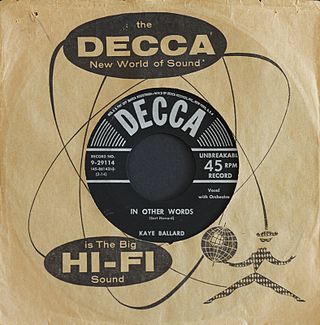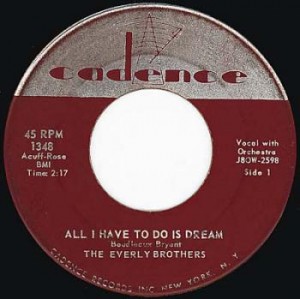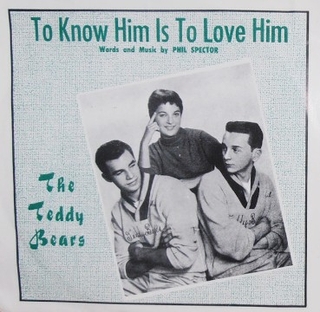Related Research Articles
Nancy Sandra Sinatra is an American singer. She is the elder daughter of Frank Sinatra and Nancy Sinatra and is known for her 1965 signature hit "These Boots Are Made for Walkin'".

"Fly Me to the Moon", originally titled "In Other Words", is a song written in 1954 by Bart Howard. The first recording of the song was made in 1954 by Kaye Ballard. Frank Sinatra's 1964 version was closely associated with the Apollo missions to the Moon.
The Billboard charts tabulate the relative weekly popularity of songs and albums in the United States and elsewhere. The results are published in Billboard magazine. Billboard biz, the online extension of the Billboard charts, provides additional weekly charts, as well as year-end charts. The two most important charts are the Billboard Hot 100 for songs and Billboard 200 for albums, and other charts may be dedicated to a specific genre such as R&B, country, or rock, or they may cover all genres. The charts can be ranked according to sales, streams, or airplay, and for main song charts such as the Hot 100 song chart, all three data are used to compile the charts. For the Billboard 200 album chart, streams and track sales are included in addition to album sales.
The Adult Contemporary chart is published weekly by Billboard magazine and lists the most popular songs on adult contemporary radio stations in the United States. The chart is compiled based on airplay data submitted to Billboard by stations that are members of the Adult Contemporary radio panel. The chart debuted in Billboard magazine on July 17, 1961. Over the years, the chart has gone under a series of name changes, being called Easy Listening(1961–1962; 1965–1979), Middle-Road Singles(1962–1964), Pop-Standard Singles(1964–1965), Hot Adult Contemporary Tracks(1979–1982) and Adult Contemporary(1983–present). The current number-one song on the chart is "Flowers" by Miley Cyrus.
"That's Life" is a popular song written by Dean Kay and Kelly Gordon and first recorded in 1963 by Marion Montgomery. The song has an uplifting message that, despite the ups and downs in life, one should not give up but keep positive, because soon one will be "back on top."

"All I Have to Do Is Dream" is a song made famous by the Everly Brothers, written by Boudleaux Bryant of the husband-and-wife songwriting team Felice and Boudleaux Bryant, and published in 1958. The song is ranked No. 141 on the Rolling Stone magazine's list of The 500 Greatest Songs of All Time. The song is in AABA form.

"Smoke Gets in Your Eyes" is a show tune written by American composer Jerome Kern and lyricist Otto Harbach for the 1933 musical Roberta. The song was sung in the Broadway show by Tamara Drasin. Its first recorded performance was by Gertrude Niesen, who recorded the song with orchestral direction from Ray Sinatra, Frank Sinatra's second cousin, on October 13, 1933. Niesen's recording of the song was released by Victor, with the B-side, "Jealousy", featuring Isham Jones and his Orchestra.

"Summer Wind" is a 1965 song, originally released in Germany as "Der Sommerwind" and written by Heinz Meier and German language lyrics by Hans Bradtke. Johnny Mercer re-wrote the song into English along the same themes as the original, which talked of the changing of the seasons using the Southern European sirocco wind as a metaphor. In America, it was first recorded by Wayne Newton and subsequently by Bobby Vinton and Perry Como.
"Sugar Town" is a song written by songwriter-producer Lee Hazlewood and first recorded by American singer Nancy Sinatra in 1966. As a single released under the Reprise label, it peaked at number five on the Billboard Hot 100 chart in December 1966, while reaching number one on the Easy Listening chart in January 1967. It became a gold record. The song was included on Nancy Sinatra's LP, Sugar, also released in 1966, and was featured in her 1967 TV special Movin' with Nancy, released on home video in 2000.

"I Won't Last a Day Without You" is a song by The Carpenters with lyrics written by Paul Williams and music composed by Roger Nichols. It was released in the U.K. in September 1972, paired with "Goodbye to Love" as a double-A side. The single reached No. 9 and spent 14 weeks on the chart. It was later released in the U.S. and became a hit single for them in 1974, reaching No. 11 on the Billboard Hot 100 chart and number one on the easy listening chart. It was the Carpenters' ninth No. 1 on the easy listening chart.

"To Know Him Is to Love Him" is a song written by Phil Spector, inspired by words on his father's tombstone, "To Know Him Was to Love Him." It was first recorded by the only vocal group of which he was a member, the Teddy Bears. Their recording spent three weeks at No. 1 on the Billboard Hot 100 chart in 1958, while reaching No. 2 on the UK's New Musical Express chart. Peter & Gordon and Bobby Vinton later had hits with the song, with its title and lyrics changed to "To Know You Is to Love You". In 1987, the song was resurrected by Dolly Parton, Linda Ronstadt, and Emmylou Harris, whose Trio recording topped the U.S. country singles chart. The song is in 12/8 time.

"Just One Look" is a song co-written by American R&B singers Doris Troy and Gregory Carroll. The recording by Doris Troy was a hit in 1963. The Hollies, Anne Murray, Linda Ronstadt and Iain Matthews each achieved great success with the song. There have also been many other versions.

"Roses Are Red (My Love)" is a popular song composed by Al Byron and Paul Evans. It was recorded by Bobby Vinton, backed by Robert Mersey and his Orchestra, in New York City in February 1962, and released in April 1962, and the song was his first hit.

"Crying Time" is a song from 1964 written and originally recorded by the American country music artist Buck Owens. It gained greater success in the version recorded by Ray Charles, which won two Grammy Awards in 1967. Numerous other cover versions have been performed and recorded over the intervening years.
"Little Green Apples" is a song written by Bobby Russell that became a hit for three different artists, with their three separate releases, in 1968. Originally written for and released by American recording artist Roger Miller, "Little Green Apples" was also released as a single by American recording artists Patti Page and O. C. Smith that same year. Smith's version became a #2 hit on both the Billboard Hot 100 and Billboard Hot Rhythm & Blues Singles charts, while Miller's version became a Top 40 hit on the Hot 100 as well as the UK Singles Chart. Page's version became her last Hot 100 entry. The song earned Russell a Grammy Award for Song of the Year and for Best Country Song. In 2013, "Little Green Apples" was covered by English recording artist Robbie Williams featuring American recording artist Kelly Clarkson, which became a top 40 hit in Mexico.

"Hurt" is a 1954 song by Jimmie Crane and Al Jacobs. "Hurt" was originally performed by Roy Hamilton, whose version peaked at number eight on the R&B Best Seller chart and spent a total of seven weeks on the chart. A version by Ricky Denell also received considerable radio airplay in 1954 on pop radio stations. The song is considered to be the signature hit of Timi Yuro, whose version went to number four on the Billboard pop chart in 1961. Juice Newton's 1985 version scored number one on Billboard's Country chart.

"Here We Go Again" is a country music standard written by Don Lanier and Red Steagall that first became notable as a rhythm and blues single by Ray Charles from his 1967 album Ray Charles Invites You to Listen. It was produced by Joe Adams for ABC Records/Tangerine Records. To date, this version of the song has been the biggest commercial success, spending twelve consecutive weeks on the US Billboard Hot 100 chart, peaking at number 15.
"With Pen in Hand" is a song written by Bobby Goldsboro and first released on his March 1968 album, Honey. The song's lyrics address the subjects of divorce and losing custody of one's child, and are sung from the perspective of the parent who expects to be losing custody of their child, as they make a final plea to their spouse to reconcile before the divorce is finalized. "With Pen in Hand" has been a hit for multiple artists in the late 1960 and 1970s.
"Please Love Me Forever" is a song written by John Malone and Ollie Blanchard. The song was originally released by Tommy Edwards in 1958. Hit versions were later released by Cathy Jean and the Roommates in 1960 and Bobby Vinton in 1967.
"Looking Back" is a song written by Brook Benton, Belford Hendricks, and Clyde Otis and performed by Nat King Cole. It reached #2 on the U.S. R&B chart and #5 on the U.S. pop chart in 1958.
References
- ↑ The End - By: Earl Grant, MusicVF.com. Accessed September 27, 2015
- ↑ Earl Grant - Chart History - The Hot 100, Billboard.com. Accessed September 27, 2015
- ↑ Whitburn, Joel (2004). Top R&B/Hip-Hop Singles: 1942-2004. Record Research. p. 235.
- ↑ "The Billboard Hot R&B Sides", Billboard , November 3, 1958. p. 50
- ↑ Earl Grant - The End (jeder Tag geht zu Ende), hitparade.ch. Accessed September 27, 2015
- ↑ "'A Story Without Any End': Nancy's 'The End' in TV Commercials", the official site of Nancy Sinatra. Accessed September 28, 2015
- ↑ "Billboard Top50 Easy Listening", Billboard , October 20, 1973. p. 37. Accessed September 27, 2015